Peter MALONE
Haute Couture
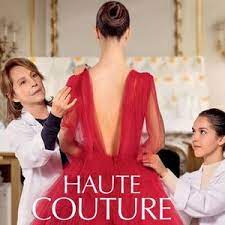
HAUTE COUTURE
France, 2021, 100 minutes, Colour.
Nathalie Baye, Lyna Khoudri, Pascale Arbillot, Soumaye Bocoum, Adam Bessa.
Directed by Sylvie Ohayon.
The title indicates exclusivity in the fashion world, it is used by the house of Dior.
Which means that this is going to be a fashion film. However, it is much more. On the fashion level, the audience is invited into the workroom of the company, the range of staff, their work, their desks, designs, skills, materials and fabrics. There are the talents of the various workers as well as the finished products and the role of the models, poses, wearing the dresses, the audience seeing the alterations as the model stands, everybody busy around her. The audience is certainly immersed in this world.
However, the film begins rather dramatically, Esther (Nathalie Baye) standing on a Metro station and two young women setting her up, stealing her bag and running away. It has quite an effect on Esther, upset, physically disturbed.
And the film shows the two young women, living in a quite a contrasting area of Paris, away from the fashion houses, neighbourhoods with racial issues, especially between Arabs and non-Arabs. We see the friendship of the two girls, especially Jade who is the centre of the action, caring for her, hypochondriac mother at home, dealing with her moods.
Jade seems to be intrigued by the woman from whom she stole, tracks her down, encounters her, gives back the bag. Instead of calling the police, Esther, noticing Jade’s fine hands, offers her an introduction to the world of fashion, inviting her in, explanations, making the work attractive, praising Jade’s possibilities.
Which means that this is a story of mentorship, a relationship between an older and a younger woman, the willingness of the older woman, the moodiness and suspicions of the younger woman, especially the criticisms of her friend at home.
And, there are the small politics within the craft room, the loyal subordinate, the haughty critical woman, the model and the hard work of just being there and wearing dresses, the young man with Arab background who changes his name to Abel and Jade’s encounter with the Arab security guard.
So, are very French human drama, characters, interactions, and for fashionistas, the satisfying scenes of design and making of high-fashion gowns.
- The title, the tone, the strict use by the house of Dior?
- Fashion, the visuals of clothes, fabrics, completed outfits, dresses, the craft, the techniques, the role of the models?
- Paris, the Metro station, the streets, apartments and interiors, the fashion company, the craft room? The contrasting neighbourhoods, hard life? The score?
- And the Metro, Esther and the snatching of her purse? Her age, life, devoted to fashion, her friends, alienation from her daughter, the Jewish background, her health? Her status with the company, accountable to the superiors, yet managing the work room, the other workers, her demands, her skills?
- Katherine, humane, supportive, her work, the challenges? The contrast with Andre, harsh attitudes, treatment of others, especially Jade?
- Jade, age, background, her friendship with wide, their life, hopes, plans, opportunities, Lack of opportunities? At home, her mother ill, cantankerous, her care for her, exasperation is? The friendship with loud, racial issues, cultural issues? Sue Our and her family?
- Jade, the decision to return the bag, the discussions with Esther, tentative, wary, the meal? Esther’s comments on Jade’s hands and her skills? Jade tentative, leaving, boots, going home, brusque reactions? Yet going to the room, discovering the craft, the workers? Learning her skills, practice, taking home work? Family reactions, Siraj reactions? A greater involvement in the work, transforming question
- Esther, her reaction, the strain, collapse, recovery, return to work?
- Abel, his role in the company, work, model, race issues, his change of name? The relationship with Jade?
- Racial and cultural issues, Arabs, non-Arabs? Esther as Jewish? Symbolised with the Arab security guard?
Villa, The. Maison de Retraite

THE VILLA/ MAISON DE RETRAITE
France, 2022, 97 minutes, Colour.
Kev Adams, Gerard Depardieu, Daniel Prevost, Mylene Demongeot, Jean-Luc Bideau, Liliane Rovere, Firmiine Richard, Marthe Villalonga, Marianne Garcia, Antoine Dulery, Jarry.
Directed by Thomas Gilou.
In a sense, The Villa is a formulaic film – but nonetheless enjoyable. This is the story of a character who is out of place, is sent to work in an institution, reacts badly, then encounters the people, mellows, and they all bond together. Happy ending. And why not!
The screenplay was written by the main actor, Kev Adams. He is obviously enjoying his role as Malinn, seen originally as a put-upon orphan, relying on his good friend, Moncef, growing up with an extreme dislike of older people, especially of elderly people. He is boarding with Moncef who is still looking after him – but he has been caught up with loan sharks, considerably in debt, but caught up in these activities by the police and sentenced to some community work. With elderly people!
So, off he goes to the Villa, not very happy, wary of the elderly – and, initially not without reason! He is befriended by one of the nurses who guides him. There is also an eccentric aide who is happy to help.
While Malinn is not enthusiastic at all about the elderly people and his initial dealings with them, the audience is very happy to meet them, especially since several are played by veteran French actors, familiar faces if not names for those who have been watching French films over the decades (but, especially, a star of the 50s and 60s who appeared in a number of British films to advantage, Mylene Demongeot). But, most of all, there is Gerard Depardieu (who also made at the same time the Balzac adaptation, Lost Illusions and starred as Inspector Maigret). He plays a former boxer, exuberant in his way, but having to face ageing, getting more and more cantankerous. This is one of Depardieu’s most engaging performances, critical of Malinn, playing jokes on him, but gradually mellowing, especially as they begin to play computer games together.
The film is not just an entertaining collection of seeing the elderly, their foibles, interactions, giving their memories, but there is a kind of subtext about what can go wrong in care for the aged. In fact, the management of this Villa is quite corrupt, taking in only residents who have no heirs, writing restrictive clauses, not letting them go out, hiring a security guard to keep an eye on them, eventually inheriting their wealth.
Which sets up a conflict, aggravated by the fact that Malinn is pursued by the violent loan sharks (though he does get boxing lessons and puts them into practice eventually), how to save the residents from the corrupt management. What happens is, for the residents, a great escape, getting out of the building, packing into buses – and driving off to freedom.
Definitely a feel-good entertainment, familiar enough material but always pleasant to see again.
- The title, the home for the aged, not so much retreat but confinement?
- A French story, French style, French human and repartee? Aged care? The 21st-century? Care and lack of care? Crimes and scams and fraud?
- Milann, his story, orphan, his friendship with Moncef, Moncef helping him out in times of trouble,, growing up, the continued friendship, boarding with him? But the influence of institutions, the elderly, his antagonism and hatred for elderly people? His criminal background, in the courts, being sentenced to community work, with the elderly? His reaction, wanting to get out of it? His going to work, his reaction to the elderly people?
- Milann and details of work, menial, cleaning? The friendship and support of the nurse? The aide and his comic style? Complaints, wanting to get out? Going back home, his friend, complaining, being ousted, climbing the wall, sheltering and hiding in the house?
- The range of older residents, some of the classic actors from French cinema? The importance of Lino, his reputation as a boxer, the pictures on the wall, the memories? Cantankerous in his old age, his physical health, his bulk? Alfred, his loss of memory, dapper presentation, the sexual agenda, the woman coming to his room, as Marilyn Monroe, Lady Gaga, Madonna, and his becoming the equivalent as a confessor to all who wanted to tell him their stories? The flirting woman going into the room, provocative? The cook, her talents, complaints to the management? The teacher, her friendship, consideration? The other members of the group, talking, sitting at table? Comparing notes?
- Malinn and his dealing with each of the residents, change of attitude, the treatment of him, talking, PlayStation with Lino, we know tempting him by leaving the money but his not taking it?
- The management, the attitude towards the residents, the contracts, trapping them, no children, no inheritance, confining them to the house, the security guard at his domination?
- Malinn and his money troubles, the loan shark, the threats – and the final confrontation, Lino teaching him how to box, his standing up for himself?
- The realisation of the crooked management, the plan, distracting the manager, the cook and her discussions about menus, the hiring of the bus, the nurse and the Aide and their help, getting the residents out of the house, into the bus, the escape, the reaction of the manager and the security guard?
- Lino, his death, leaving the money to Malinn, the nurse and her connections?
- A happy ending, for all concerned, Malinn, reconciled with his friend and girlfriend, the money sharks, and the elderly residents free?
Good Luck to you, Leo Grande
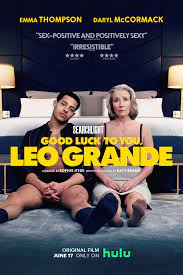
GOOD LUCK TO YOU, LEO GRANDE
UK, 2022, 97 minutes, Colour.
Emma Thompson, Daryl McCormack, Isabella Laughland.
Directed by Sophie Hyde.
A sex worker is hired by a widowed religious education teacher for an evening at a hotel.
That answers the question: what is the film about? It does not indicate how the subject is treated, though there is a genial message in the title for Leo Grande, the sex worker.
The film is a two-hander which could be performed on stage. It consists mainly of dialogue and is expertly performed by Emma Thompson as Nancy and Daryl McCormack as Leo, Irish and with his accent.
Watching Leo and Nancy at the press preview made me realise that there were two basic responses. For “secular” Western audiences, the film was an interesting, often humorous, easy watch, comfortable in talking about bodies, male and female, about sexual experience and pleasure, about looking at past attitudes and restraints, restrictions, about new calmer freedoms. This is a particularly Western society perspective.
But there is another approach, to a film dealing with sexuality, perhaps a subject that is too private and delicate for a film dramatisation. And the question arises as to what we mean by prudish and how much of this is sensitivity, how much fear of the subject. Many cultures and many religions and church traditions approach from a more prescriptive perspective: Thou shalt, Thou shalt not… (With an intransigent intolerance).
In the film, Leo Grande represents the former view. He is more than comfortable in his chosen role as a sex worker, providing a service, perhaps able to provide some healing for a client’s bad past experiences or attitudes (except that he has not told his mother). That is his philosophy of life and he is at ease with it.
Nancy, on the other hand, is very straight-up-and-down in all aspects of her life, with her husband of 30 decades, her children (though she finds her son boring, her daughter reckless). And she has been strict with the girls in school, especially in essays on sexual morality. She likes plans, order, lists…
But, in her late 50s, she realises she feels deprived, her sexual life having been one of very matter-of-fact, brief and rapid “conjugal duties”. No corresponding awareness, of course, of sexual pleasure. (Memories of Robert Mitchum and Sarah Miles, 50 years ago, dramatising the matter-of-fact proper conjugal rights and duties and Ryan’s Daughter dissatisfied, yearnings, set in an Irish Catholic moral framework of commandments and expectations.)
Now, two years a widow, Nancy has hired Leo, a list of suggestions of what is to be done.
Yes, there is sexual activity. However, it is in the context of four meetings between Nancy and Leo, their discussions, telling their stories (and sometimes not), analysing past codes and their inadequacies, speculating on changing attitudes and behaviour, Nancy and a sexual curiosity, a desire for awakening late in life.
Leo faces some of his own realities, challenged by Nancy. Nancy is very much challenged, has a revealing confession conversation with a past pupil and, eventually, stands at the mirror, naked, acknowledging the reality and limits of her body.
Which means that the audience realises, at the end, they have been looking at the film as in a mirror, looking at bodies, sexual activity, pleasure, mirror-testing their own values and stances, wondering about their own reflections.
In the past 60 years, Catholic theological reflection on sexuality has moved from Moral Theology Manuals and their declarations of principles to a deeper understanding of marriage, psychological awareness and even, as with Pope John Paul II and his writings, a theology of the body.
And we remember that this is just a film, just over 90 minutes, two characters, conversations, personal and moral questions, particular perspectives – and remembering that it does not cover every aspect of sexuality and relationships, that they can be helpful conversations (as Leo and Nancy find out). For instance, the renewed Catholic moral awareness of deeper aspects of sexuality and marriage could provide further questions in challenges.
And there is always the answer to the Gospel question: how did Jesus relate to sex workers?
The title and tone? Jovial? And the audience wondering who Leo Grande was?
- The British two hander, adaptable for the stage, the emphasis on dialogue? The hotel room and its layout? The fourth sequence and the restaurant downstairs? Limited spaces?
- The casting, the performances, Emma Thompson and her long career and reputation, awards? Daryl McCormack and his career, making his mark with this film? The chemistry between the two?
- The basic premise: the hiring of sex workers, business, prostitution, the language of sex worker rather than prostitution? The accusation of this sanitising issues?
- Sex workers, their clients? Treatment of clients, respect, listening, attentiveness? Dialogue and learning? Challenge? In the case of Leo and Nancy?
- Nancy, in her 50s, married for 30 years, her husband dead for two years, her career as religious educator, ethics? Her son and his studies and she thinking him boring? Her daughter more reckless? The daughter’s phone calls? Her personality, straightforward, somewhat rigid, planning, lists, principles?
- Nancy and her reflection on her marriage, her relationship with her husband, sexuality aspects, conjugal duties, the brief sexual encounters and the husband’s response, her lack of response, feigning? The years passing? Reflecting on this, feeling deprived, the need for some kind of awakening? The decision to hire Leo? Bringing her list? Sexual activities that she wanted to test, orgasm, fellatio, sexual positions?
- Leo, at ease, his personality, Irish accent, the later revelations about his mother, not knowing he was a sex worker, the further revelation about his being a teenager, with his friends, his mother catching them, disowning him, not acknowledging him in the street? His saying that she thought him dead, his indications that he worked on an oil rig? His relationship with his brother, not telling him, later revealing the truth to him? His decisions, his ease at being a sex worker, no moral qualms, open to all behaviour?
- Nancy, tense, with her list, wanting to get things done and finished, peremptory, yet talking with Leo, finding out more about him, her opening up herself about her life? Even to her setting essays for the students on sexuality and morality? The transformation in her, her belonging to a former generation, conjugal duties, no emphasis on sexual pleasure, supporting of the husband and his will?
- The structure of the film, the four meetings, the level of discussions, intimacy? Nancy’s list, the discussion about the fellatio? The move towards the cunnilingus sequence and its effect on Nancy? Her further list for behaviour? And gradually fulfilling the list? The comparative visual reticence initially, expanding visually, the final, Leo naked, Nancy and the orgasm, and her finally looking at herself in the mirror, accepting herself? But transformed by the experiences with Leo?
- The bond with Leo, the easy times together, the dancing and music? Conversation? Yet the probing, Leo upset, his walking out?
- The final meeting, the different venue, the waitresses, Becky remembering Nancy, the discussion about calling the girl sluts, the essays? Leo’s arrival? The conversation with Nancy, mellowing, reconciling, and Leo urging her to relate better to her son? Her decision to make a full confession, publicly, Becky listening, bewildered?
- Leo, the end of his work with Nancy as a client, achievement, satisfaction, and his walking out of her life? And her accepting this phase of her life?
Sequin in a Blue Room
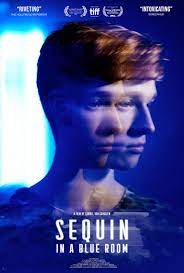
SEQUIN IN A BLUE ROOM
Australia, 2019, 80 minutes, Colour.
Connor Leech, Jeremy Lindsay Taylor, Anthony Brandon Wong, Ed Wightman, Samuel Barry, Simon Croker, Patrick Cullen.
Directed by Samuel Van Grinsven.
In fact, with the title, this film declares that it is a “Homosexual Film”. Some of it is based on the experiences and imagination of the co-writer and director.
At the centre of the film is a 16-year-old, Sequin, still at school, with some school sequences, especially with the female teacher talking about classics which describe relationships, such as Heathcliff and Wuthering Heights. However, Sequin spends most of the class time on his mobile phone, various sites, homosexual links, especially the Blue Room.
Sequin also lives at home with his father, single father, trying to relate to his son, affirming him, but eventually exasperated by his staying out at all hours, unwilling to have conversations with him, finally angrily ousting him from the house.
Sequin is preoccupied with gay life and encounters. In fact, he makes himself available to a number of clients, a young sex worker in the making, knowledgeable, standing up to others, but with quite an amount of inner insecurity. He gets information about a gay club, the Blue Room, and ventures there, making contact with one of his clients, meeting other men who are attracted to him, but his attention given to another man, Edward, with whom is fascinated and later fantasises.
There is also a boy in his class, Tommy, who makes an advance, their meeting in the toilets Sequin seeming superior but, in conversation, agreeing to go out with Tommy to see a movie.
However, he is preoccupied with his images of Edward, makes enquiries and tracks him down, and the harsh reality of Edward’s life and relationships not corresponding with Sequin’s fantasies.
At one stage, Sequin is bashed, takes refuge in a Drag Queen club, especially looked after by the sympathetic Drag Queen, Virginia, a good listener, very good with advice, urging Sequin to make contact with his father.
This is a young man’s story, a story of precocious sexual behaviour, still leaving the uncertainties as to what the future holds for Sequin. After all, in the film he is only 16, his life before him.
A Plein Temps/ Full Time
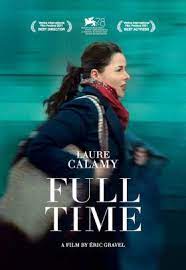
FULL TIME/ A PLEIN TEMPS
France, 2021, 88 minutes, Colour.
Laure Calamy, Anne Suarez, Genevieve Mnich, .
Directed by. Eric Gravel.
Thank goodness that Full Time ran for only 88 minutes. This is meant as a compliment, not as a put down. For the first 60 minutes and more, the pace is frantic. And, not only are some of the characters exhausted, but so many of us, sitting comfortably in our cinema seats as well.
This is a story of a week in Julie’s life (Laura Calamy). She is a working mother, two small children, up early in the morning, breakfast, taking them to the elderly lady who will care for them during the day, getting the train into Paris, getting to work, head of the staff at a three-star hotel, non-stop work in cleaning the rooms, assessing the work of the others, clocking out and then getting the train home.
As if this is not hard in itself, the situation in Paris is a strike. So, clogged freeways with cars, trains running spasmodically, not going to their destinations, the need to change to buses, passengers deposited and having to run to work. And, as the week goes by, the strike situation gets worse. And so does the anxiety of the old lady looking after the children, a daughter urging her not to do this work, putting more pressure on Julie as to who should look after the children.
The way that the film works, and which makes it so exhausting (technically very effective), is that for the main part, each shot is very brief, the editing fast-paced, a lot of tracking camera work, especially as passengers look at the passing suburbs, buildings, life in Paris, and there is an insistently relentless score beat which emphasises how frantic Julie can become – and how frantic we are as we identify with her.
And, there are complications at work, especially as Julie has the opportunity to go for an interview for a new job – and the lack of taxis to get to the interview, her persuading the concierge to get her a ride, difficulties with getting time off, no permissions, getting the work done during lunch break, persuading the newcomer to clock out for her, with disastrous results.
And that is the first hour!
With relief, there is a bit of restraint over the weekend, although it is the little boy’s birthday, Julie has hired a van to bring home a trampoline as a gift, setting it up, the party, her being exhausted. And the issue of the nanny and whether she can continue.
Laura Calamy is very effective and believable as Julie. So is her boss, the other maids.
Just when all seems doomed…
- The title, Julie, her life, full-time work, full-time motherhood, stresses?
- The French setting, the city of Paris, hotels and interiors, business offices, the streets, the experience of a strike, cars on roads, trains and buses, absence of transport, crowds? Audiences empathising with the experience of strikes and the difficulties in travel and time?
- 88 minutes, the pace of the film, the takes being generally very short, editing and pace, the relentless beta the musical score, the tracking camera and its energy and life? Exhausting for Julie – but rather exhausting even for the patron sitting in the cinema seats!
- A week in Julie’s life, getting to work, difficulties because of the strike, the work in the hotel, the pressures, interactions, her planning the job interview, the difficulties with the boss? The children, up early, breakfast, taking them to the lady looking after them, the phone calls, the pressures? Getting to work, crowded trains, transfer to buses, getting lifts, the friendly lift from Leo’s father, growing exasperation, the high cost of the taxi for the interview, having to stay overnight at the hotel? Interviews with the boss, her finally being locked out?
- The change of pace for the weekend, picked up by her friend, getting the children, going home, the little boy’s birthday party, hiring the van to bring the trampoline, setting it up, the children, Leo’s father helping with the trampoline, cleaning up? The boy falling out of the trampoline, the visit to the hospital? The long sleep? And all the time phoning her former husband, asking for the alimony, the pressure on the mortgage, withdrawing money from the bank, checks not accepted? Is not turning up for his son’s party, the phone call, out of the country, promises?
- The continued pace of the first hour of the film, sharing Julie’s getting up early, breakfast, the children to the nanny, trying to get to work, running, arriving late, checking in, the detail of the work, the maids, the expectations of the high paying guests, the excrement on the wall and cleaning it, the timetable, visitors coming early, making the beds, cleaning, the attention to detail? The bond between the women, the hostile woman and not helping Julie, Lydia and her having to train her, using her to get to the interview, returning and finding that Lydia had been sacked? The threats to Julie?
- Her past work, the years of motherhood, the interview, promoting herself, being called back, the difficulty in getting the taxi? The sympathetic interviewer, the promise of the phone call, it’s not coming, Julie ringing?
- Julie being sacked, returning home, the discussions with the nanny and her daughter’s threats about official complaints? The willingness of the old lady?
- The children, wanting to go to the theme park, taking them, on the rides, their being happy? Julia, the phone call, and the relief getting the job?
- Fast-paced drama, forcing the audience to share Julie’s life, pressures, her exasperation is, wondering about some of her tactics, the consequences? And the final affirmation for her future?
Mirror Cracked from Side to Side, The
THE MIRROR CRACK’D FROM SIDE TO SIDE
UK, 2010, 100 minutes, Colour.
Julia Mackenzie, Lindsay Duncan, Joanna Lumley, Nigel Harman, Victoria Smurfit, Brendan Brown, Caroline Quentin, Martin Jarvis, Hannah Waddingham, Olivia Darnley, Michelle Dotrice, Charlotte Riley, Lois Jones, Neal Stuke, Hugh Bonneville, Samuel Barnett, Will Young.
Directed by Tom Shankland.
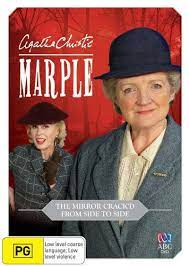
This film is based on the novel dedicated to Margaret Rutherford after Agatha Christie, who did not approve of the casting, was impressed by Margaret Rutherford’s performance as Miss Marple.
The cinema version proceeded the two television versions, one with Joan Hickson (her last as Miss Marple) and Julia Mackenzie. The cinema version had a star cast with Angela Lansbury as Miss Marple and Elizabeth Taylor and Kim Novak as the rival actors, with Rock Hudson and Tony Curtis as husbands.
This version stays close to the novel, opens with Miss Marple and her friend Dolly (Joanna Lumley agreeably dotty) watching a Marie Antoinette film starring Marina Gregg. Dolly it emerges has sold her estate to Marina Gregg and her fifth husband, the Dir of the film. Marina Gregg is older, a younger husband, tantrums, but having an open house for the locals and for charity.
A murder takes place at this reception, a chatty woman from the village of St Mary Mead, poisoned. There is a lot of speculation on possible murderers, the staff and assistance of the style and the director, the staff, but, especially a gossip columnist, former husband of Marina, and his flamboyant girlfriend, arrival of Marina.
The title comes from the Lady of Shalott, her looking into the cracked mirror, seeing doom. Marina has a moment of the reception of staring seemingly into space – but, as the scene is revisited, it has a great deal of meaning. And, the murderer with a lot of misdirection from the screenplay turns out to be a surprise (as always).
- The popularity of Agatha Christie novels? Television versions? The several versions of this story, for cinema, for television?
- The title, the quotation from the Lady of Shalott, looking in the mirror, the cracked mirror, sense of doom and fate?
- The theatrical opening, Marie Antoinette, the play, Marina Gregg and her performance, Miss Marple and Dolly watching, tearful, meeting the actress, her husband, and the fact that Dolly had sold her house to them?
- Life in the village of St Mary meet, Miss Marples home, her accident, later, the doctor, the maid? Phone calls? The invalid getting information?
- The party, the guests, introducing the characters, Jason, Marina’s fifth husband, previous relationship with Amanda, and Hogg, his work as a director, protecting Marina? Marina herself, the star, all the magazines and write-ups, a reputation, her age, marriages, the later information about adoption, disregard of those children, the pregnancy, the child being born ill, in the institution? Heather, helping Miss Marple, all the fan magazines, the chatter with Marina, Marina and her fixed gaze at the wall, Heather’s chatter and meeting her despite being sick? Vincent Hogg, the flamboyant Amanda and past rivalries? The various secretaries and assistants? The maids? The mayor and his wife?
- Dolly, the mayor’s wife, looking through the house, the assistant with hayfever? The sudden death? The doctor?
- Inspector Hewitt, the young captain as his assistant, fan of Marina? The inspector straight up-and-down, the interview with Miss Marple, getting information, insights, the interview with Marina and her resistance, tears, the response of her husband? Tidler and the autograph? The interview with Amanda, the inspector and the touch of the roving eye?
- The scene at the filming, Vincent Hogg and his column and articles, the phone call about administering the poison? Marina’s assistant and the similar call? Marina, as Nefertiti, the gay actor as, the tantrums about the lines, drinking the coffee, declaring it was poisoned? Jason later having it tested?
- Jason’s assistant, her devotion to him, the hayfever, her theories, her being killed?
- Miss Marple, the information, the discussions with Dolly, Dolly as unreliable, the maids, the chatter, Miss Marple arranging the maid to go on a holiday, avoiding being killed?
- Photographer, taking photo of Dolly, of Marina and her fixed stare? Dolly and Miss Marple visiting, looking at the photos, the revelation about her being Marina’s adopted daughter, her hostility?
- Marina and her visiting the institution, her son, trying to reach out to him?
- Miss Marple visiting the house, Marina’s stare at the Madonna picture? The information about Heather and the spilt drink, the exchange drink, Marina as the target? The revelation that Marina spilt the drink herself?
- The reconstruction of what happened, the background of the pregnancy, the infection, the boy born with illness, no explanation, Marina blaming herself? The sudden revelation of the truth, vengeance, her poisoning Heather? Her poisoning the witnesses? Her husband protecting her? And the overdose and her death?
- A satisfactory murder mystery, Miss Marple detection, and the unexpected murderer?
PERSUASION site
Persuasion/ 2022

PERSUASION
UK/US, 2022, 107 minutes, Colour.
Dakota Johnson, Cosmo Jarvis, Richard E.Grant, Yolanda Kettle , Simon Paisley Day, Nikki Amuka-Bird, Stuart Scudamore, Henry Golding, Mia McKenna-Bruce, Nia Towlel.
Directed by Carrie Cracknell.
Persuasion was last published novel by Jane Austen before her death. It has not received the cinema and television treatment as the more popular and well-known novels. However, there have been television versions.
The central character of the stories, Anne Elliot, a self-assured young woman, especially after the disappointment of the breaking of her relationship with Wentworth, a naval man who has gone to sea. Anne lives in one of those contradictory families, like the Bennetts of Pride and Prejudice… Anne’s extravagant father, played by Richard E.Grant, the haughty sister, a married sister who is a hypochondriac thinking only of herself and rationalising everything she does as if she were altruistic! Anne is unexpectedly played by American, Dakota Johnson – and with Anne’s assurance.
The action takes place some years after the break between Anne and Wentworth, difficult financial times for the family, visits to her hypochondriac sister, a welcome into another family, the Musgraves. There is also a visit to the seaside town of Lyme Regis, and some wonderful beach sequences as well is cliff sequences and walking parties climbing cliffs.
And, Wentworth returns from the sea, awkward in the presence of Anne and she with him, feigning a distance in their awareness of each other. This is awkward for Wentworth, Cosmo Jarvis, who has achieved a solid reputation in the Navy, but is looking for some kind of future. One of the Musgrave sisters, after an accident, becomes infatuated with him, an engagement.
In the novel, Jane Austen tells the story from Anne’s narrative of events and characters but also insinuates Anne’s subjective point of view. The screenplay uses the device of Anne breaking the fourth wall, talking to camera, talking to the audience, ironic remarks, raised eyebrows, some asides, so that the audience becomes complicit with Anne’s perspective. This seems to be a good 21st-century device for communicating Jane Austen’s characterisation of Anne. However, there have been some objections that along with the main 19th century dialogue, there is the introduction of many 21st-century words which will seem very much out of place to those who have read the novels but will be easily accepted by those who have not.
Direction is by Carrie Cracknell, a well-acclaimed theatre director.
- Lasting popularity of Jane Austen’s novels? The range of versions over many decades? Cinema, television? This film made for television?
- England in the beginning of the 19th century, the settings, country estates and homes, the countryside, society, Lyme Regis and the coast? Costumes and decor, scenic atmosphere? Musical score?
- The story of Anne Elliott, the casting of Dakota Johnson, her British performance and accent? Anne’s background, her being father, target of satire? Her self-centred sister? Her arrogant sister? And in the middle, observing?
- Jane Austen’s technique of Anne telling the story but also confiding her point of view to the audience? This film and the cinema device of breaking the fourth wall, and continually glancing at the camera, at the audience, information, ironic touches, reactions?
- The background of Anne Elliott and her love for Wentworth, his background, the families attitude towards him, the breaking of the relationship? His going to sea, successful naval career, his return? His moving into society, the welcomed by the Musgrave family, and then having to deal with his return, concealing the past friendship, gradually manifesting? Louisa, her infatuation, the family response to Wentworth? The meals, conversation, the tension between Anne and Wentworth?
- Issues of money, homes, Sir Walter, moving out, visiting his daughter, flamboyant manner? The contrast with his daughters, the older, following her father’s attitudes, attitude towards Anne? The married daughter, her husband, children, her self-centredness, the various episodes and her self-indulgence?
- The arrival of Mr Elliott, the family connection, the buildup to his coming, his marriage, relationship, the possible inheritance? His behaviour, Anne and her reaction? And the revelation of Louisa’s infatuation with him?
- Lady Russell, society status, her friendship with Anne, the meetings, continued advice?
- Wentworth, in himself, the past, the Navy, caught in the times and behaviour expectations, Louisa, the walks on the cliffs, conversations, engagement? Yet his devotion to Anne, the conversations?
- The arrival of Mr Elliot, manner, style, past, claim to be the heir, attraction to Anne, to Louisa?
- The resolution of the emotional problems, Louisa and Mr Elliott, Anne and the breaking down barriers, a future with Wentworth?
- Criticisms of the modernisation of the attitudes and some of the vocabulary choices? Too modern for Jane Austen literary tastes? Yet bringing Jane Austen to contemporary taste?
Sundown/ 2021
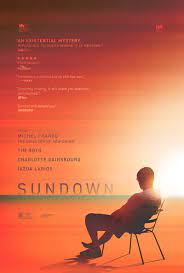
SUNDOWN
Mexico, 2021, 82 minutes, Colour.
Tim Roth, Charlotte Gainsbourg, Albertine Kotting McMillan, Samuel Bottomley, Iazua Larios, Jesus Godinez.
Directed by Michel Franco.
A brief film, popular with arthouse audiences and film festival screenings. It was originally called Driftwood, indicating the lifestyle of the central character. However, Sundown with its application sunset both physical and of life, seems a more apt title. It was written and directed by Mexican director, Michel Franco.
Despite its brief running time, this is a comparatively slow-moving film, moving with its central character, Neil, British, on holiday with his sister and her children in Acapulco. His played by Tim Roth and the impact of the film depends on audience response to Roth and his interpretation of this character.
At first, the audience is invited to luxuriate at an Acapulco resort with Neil, with his sister, Alice (Charlotte Gainsbourg) and her adult children. It is clear that they are affluent and that this is quite an upper-class resort. Then comes some interrupting drama, with news that Neil’s and Alice’s mother is dying in England, then that she has died.
However, Neil pretends that he has left his passport behind does not go with the family to England, going back to the resort, checking out, finding a sympathetic taxi driver (who later becomes the villain of the drama), checking into a small hotel and spending all his time, wandering, lounging in the sun, on the beach, continually drinking beer. He seems absolutely idle and we as an audience might wonder why.
But there is more drama to come, Alice returning, confronting Neil about his abandoning her and the family at a crucial and emotional time, her children also returning violently attacking Neil.
Gradually, some of the family details, the family business, are revealed, Neil and his preference for drifting in Acapulco, not wanting to return to the business. There is a shock when a crime is committed and Neil arrested and held in prison under suspicion.
However, there is a resolution – of sorts. Neil opts for Acapulco, the pleasant company of a young woman, Berenice, encountered at her shop and had spent a lot of time with her.
Then a final revelation, why the film is called Sundown. And, without an ending as such, the film stops, leaving us to reflect on what we have seen, on Neil and his character, on the issues.
- A British story in the Mexican setting?
- Acapulco, the city, the views, buildings, streets, hotels, restaurants? Resorts and comforts? The beaches? The sea? Prison and police precincts? The musical score?
- Neil’s story, his family, the financial background, his age? On holidays with Alice and her children? Enjoying the lavish resort? The high lifestyle? The interaction, the news of his mother’s illness, the news of her death, Alice planning return to London, the airport, Neil saying he had lost his passport, going back to the hotel?
- Neil and his deception, leaving the resort, meeting Jorge, the hotel, his connections, the landlady, the room, his things later being stolen? His staying in Acapulco, refusing Alice’s phone calls, eating out, drinking beer, at the beach, sunning himself? Audience response to his behaviour?
- Alice and her return, confronting Neil, blaming him for not supporting her at their mother’s death, absence from the funeral? The discussions about the will? The presence of the lawyer? The discussions, Alice and the management, a monthly allowance for Neil? Alice and the confrontation with Jorge and the men, her death?
- The arrival of the niece and nephew, their bitterness torture Neil?
- The lawyer, signing over the whole company to them, his allowance?
- The arrest, accusation of conspiracy to kill his sister for the money? In prison, the lawyer, Freed?
- Walking the streets, the shops, the encounter with Berenice and her friends, meeting up, the relationship with Berenice, relying on her, her company?
- Neil, free, his fall, hospital? Getting out, walking the streets, leaving his clothes, the film ending, his disappearance? Death? Suicide? The film’s title and the Sundown of Neil’s life?
Forgiven, The/ 2021
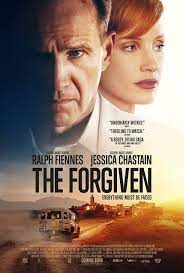
THE FORGIVEN
UK, 2021, 117 minutes, Colour.
Ralph Fiennes, Jessica Chastain, Matt Smith, Caleb Landry Jones, Abby Lee, Christopher Abbott, Mari-Josee Croze, Alex Jennings, Said Taghmaoui, Ismael Kanater.
Directed by John Michael McDonagh.
John Michael McDonagh wrote and directed the very affecting Irish drama about sexual abuse, Calvary. He also made the drama, The Guard. So, expectations from him him? Not quite fulfilled?
It is difficult to engage with the range of Western characters who are introduced at the opening of the film. They are from Britain, America, France. They see themselves as culturally superior to the local Moroccan Arabs. And, they drive through the Moroccan desert to the home of a wealthy gay couple who are throwing a party, extravagant, swimming pools, lavish food, servants (whom they look down and take for granted), an extraordinary cultural contrast between the Westerners and the locals.
In wondering how to describe these characters, this description from an IMDb blogger, Xstal, hit the mark: ‘An out of touch and dislikeable group of misfits, also rans and holier-than-thous, gather in a remote part of Morocco to celebrate and carouse’.
But, the central characters, David and Jo, he a doctor from England, she his American wife, drove through the desert and night to the party, crashing into a young man who wanted to sell them a souvenir, killing him, then burying his identity card, but taking his body on to the resort. The police arrive. Interrogations. Declaration of an accident. David is played by Ralph Fiennes, surly, commenting that his father said that we live in a difficult word and the only way to deal with it is to mock it. He is also alcoholic. His wife, on the other hand, is a hard to fathom character, not helped by Jessica Chastain’s odd, ambivalent performance.
However, there is the possibility for involvement with the film after the uninvolving distance it initialy sets up with its characters and their behaviour. The father of the dead boy comes to retrieve his son’s body, encounters David who agrees to accompany him back to his home, helped by his sympathetic friend, Anouar (Said Taghmaoui). It is a significant journey for David, uncertain, conscious of his responsibility with the boy’s death, the father acting mysteriously, a long journey through desert detours, no alcohol. As the audience thinks about the title of the film, we wonder about David and his repentance, whether he is being forgiven.
Important themes are articulated when David compliments Anouar as being a ‘decent’ and he returns the compliment by calling David an ‘honourable’ man. And, facing the aftermath of the party as most of the characters drive off to the next one, leaving the hosts rather empty, David is challenged even more to take the responsibility for what he did, drunk, arguing with his wife, speeding, responsible for a death – and whether he is forgiven or not.
- The title, crime, punishment, accident, responsibility, justice, facing reality, and I for an eye?
- The Moroccan settings, the range of desert scenery, mountains, harsh sands, night? The home in the middle of the desert, luxury? The contrast with the huts for the locals? The musical score?
- The range of characters, unlikable, dislikeable? Western culture, British, American, French? The contrast with the local Moroccans? Culture gaps, financial gaps? Honesty and dishonesty, thievery? In the life of Western decadence?
- The focus on David and Joe, on the boat, the first glimpse of Africa, the tension between them, brittle marriage, his work as a doctor, his drinking? Hiring the car? Is culturally insensitive attitudes and behaviour? Superiority? The arguments between the two? The drive, by night, hitting the young man, bearing his identity card, taking him to the compound? David and the consequences, the accident, participation in the party, his drinking, sardonic remarks? The police arriving, the interviews, the accident? The father of the dead man, the meeting with David, David agreeing to go with him, his friendship with Anouar, the conversations, the silent father, the drive, detours, sense of tension, possibilities for vengeance? Arrival of the heart, the body, the grieving women, the burial of the body? David in the locker room, the conversations with the father, the morning, clean clothes, everybody gone, the father’s return? The drive, the farewell, the father speaking in English? Telling the story of his son and his wishes for him, archaeology, sales, prosperity? David and his return, buying the local shirt and wearing it, back at the compound, interactions with his wife, his suspicions, driving away, held up, the young man with the gun, David allowing himself to be shot? His descriptions as an honourable man?
- Themes of decency, behaviour, attitude? Anouar is decent? David is honourable?
- Richard and Ali, the gay relationship, English and American background, affluence, the resort, luxury, the guests, behaviour, relationships, cultural superiority, sexuality, adultery? Aftermath? Richard and his character, the host, the relationship with Dalley, the welcome, presiding over the events? The aftermath?
- Tom, American, his presence, interactions with Joe, flirting, the adultery, the consequences for him, for Joe? His leaving without saying goodbye?
- The other guests, flamboyant, the swimming pool, costumes, dancing, the Lord from England, his entourage?
- Audiences and the main characters, identifying with them on not?
- The Arab characters, the two young men, the background of archaeology and souvenirs, high sales, drugtaking, the gun, trying to sell the emblem? The father, his attitude, hopes for his son? The men working at the resort, tolerant of the behaviour, get spitting on the drink? Hopes of getting jobs and more fashionable hotels?
- The change of tone with David and his journey, an interior journey, giving the money to Anouar, acceptance of responsibility, his death? Forgiven yet executed?
Nemesis/ 1987
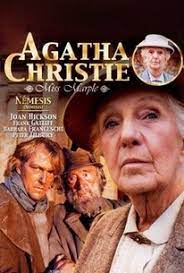
NEMESIS/ 1987
UK, 1987, 102 minutes, Colour.
Joan Hickson, Peter Tilbury, Bruce Payne, Patrick Godfrey, Helen Cherry, John Horsley, Margaret Tyzack, Liz Fraser, Peter Copley.
Directed by David Tucker.
This is the first television version of Agatha Christie’s novel, Nemesis. It features Joan Hickson. Another version over a decade later featured Geraldine McEwan and a plot, which resembles the original, but has amplified the plot, associating the dying man with Nazi Germany, his son as a Luftwaffe pilot intern during the war, the family of sisters turning into nuns…
This is more straightforward version, a dying man sending a message to miss Marple to rectify a wrong, his sending out bus tickets for a tour, other members of the tour, unearthing information, clues, and another murder.
The film has a strong cast including veteran Helen Cherry as well is Margaret Issak and Liz Fraser.
It is vintage Joan Hickson Miss Marple.
- The clarity of Agatha Christie novels? Miss Marple? Different screen versions of this story?
- Joan Hickson is Miss Marple, characteristics, personality, investigations?
- The situation, the death of Jason Rafiel, plans, righting of wrongs, his relationship with his son? His ingenuity in employing Miss Marple, fees, the two women bodyguards, the professor?
- Miss Marple, memories of Justin Raphael, her nephew, his separation, travelling with his aunt? Taking up the bus tour? The people on the tour? The destinations? The interconnections?
- The story of Verity Hunt, to marry Michael, her reputation, people speaking well of her, her death? The sisters and their caring for her? The Archdeacon and his memories? Miss temple and her memories?
- The personalities on the tour, to suspicious women, observing, the later meal with Miss Marple, with the gun, their role as bodyguards? The professor, his talent, his also being employed to investigate?
- The encounter with the sisters, their background, their home, Verity in their care? The older sister, married, the hospitality? The younger sister, flighty?, Studious, her research? The hospitality to miss Marple?
- Michael, suspicions in the town, to marry Verity, her death, his leaving, alienation from his father, living rough in London, immediate impressions, the gradual truth about him, doing good? Confronting the lawyers in their offices? The nephew and his search for Michael? Finally coming into his own?
- The story of the girl who disappeared, Miss Marple visiting her mother, the information, the truth about her murder, being buried in Verity’s grave?
- Miss temple, genial, information, the decision to write the letter, the death?
- Miss Marple, going to the sisters for the meal, the poisoned milk, the confrontation with Clay to, closer to and her story, the infatuation with Verity, killing Nora and burying her body, killing Verity and burying her in the garden? Drinking the milk, going to the graveside to die?
- Miss Marple as nemesis?